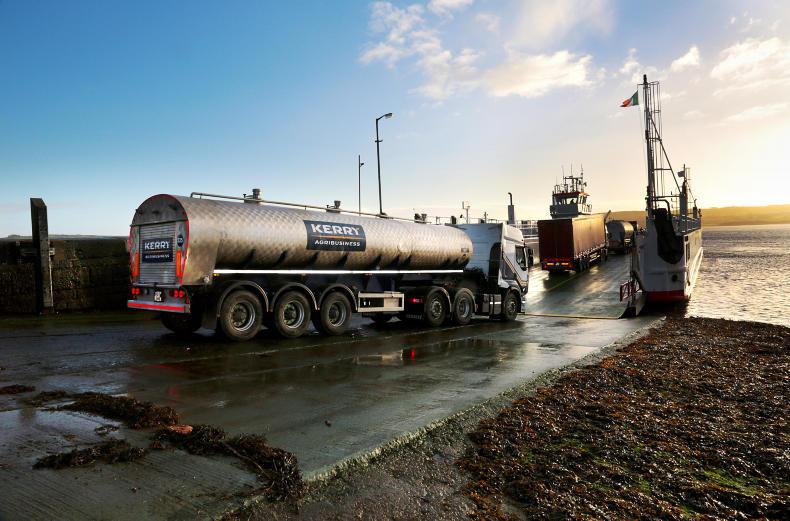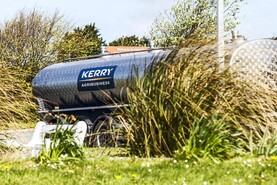On milk price outlook, the new Kerry chief executive Edward Scanlon said “the milk price today is not sustainable based on demand today”. However, he added that it is early in the year and “too early to pin where it will be by May”.
He said he was concerned with the volume growth currently coming out of Germany and France. He says he is also watching US milk supply growth. He sees demand growth in the Middle East, driven by improving oil prices picking up the US supply increases.
He says “volatility is the enemy” in today’s markets and that everyone along the supply chain wants to take volatility out of the equation, saying that “everyone would prefer an even keel”.
Kerry is working to tie contracts all the way forward into customers and Scanlon said one of the ambitions of Kerry Group is to give more certainty to farmers.
He says supply will drive prices this year. He sees demand as solid across the globe. He believes the long-term fundamentals for dairy are strong as consumers still value real food that is natural, adding that Irish dairy farmers produce a top-quality product that is in demand.
Relationship
Scanlon reiterated the importance of Kerry Group having a good relationship with farmers. Milk supply increased 5.5% last year. However, the group expects this to level off in the coming years. He says Irish dairy farmers are an integral part of the model and that there are no plans to change the model. He said there were challenges around the age profile of its farmer suppliers and succession.
“I’d be optimistic for Irish dairy. I’ve been on the other side of the fence, working in Asian markets. Ireland has a great product and we must keep the narrative positive. Origin Green and Bord Bia are doing excellent work and we must manage the narrative and be proud of what we have.
“The Chinese have a preference for Oceanic and western European dairy products,” according to Scanlon, who spent a large part of his career with Kerry in Asia and Chinese markets.
On Brexit, he says it is a real threat. However, he reiterated that Kerry’s exposure to the UK is quite small, with as little as 3% of total revenues coming from this market. He says Kerry’s strategy has been to have a manufacturing footprint in the markets where they are selling product.
He sees further consolidation in the global ingredients market and says Kerry has the appetite for further acquisitions.
He concluded: “our game is a long game and we do the right thing for our shareholders in the long term.”
Read More
Solid performance from both Kerry and Glanbia
On milk price outlook, the new Kerry chief executive Edward Scanlon said “the milk price today is not sustainable based on demand today”. However, he added that it is early in the year and “too early to pin where it will be by May”.
He said he was concerned with the volume growth currently coming out of Germany and France. He says he is also watching US milk supply growth. He sees demand growth in the Middle East, driven by improving oil prices picking up the US supply increases.
He says “volatility is the enemy” in today’s markets and that everyone along the supply chain wants to take volatility out of the equation, saying that “everyone would prefer an even keel”.
Kerry is working to tie contracts all the way forward into customers and Scanlon said one of the ambitions of Kerry Group is to give more certainty to farmers.
He says supply will drive prices this year. He sees demand as solid across the globe. He believes the long-term fundamentals for dairy are strong as consumers still value real food that is natural, adding that Irish dairy farmers produce a top-quality product that is in demand.
Relationship
Scanlon reiterated the importance of Kerry Group having a good relationship with farmers. Milk supply increased 5.5% last year. However, the group expects this to level off in the coming years. He says Irish dairy farmers are an integral part of the model and that there are no plans to change the model. He said there were challenges around the age profile of its farmer suppliers and succession.
“I’d be optimistic for Irish dairy. I’ve been on the other side of the fence, working in Asian markets. Ireland has a great product and we must keep the narrative positive. Origin Green and Bord Bia are doing excellent work and we must manage the narrative and be proud of what we have.
“The Chinese have a preference for Oceanic and western European dairy products,” according to Scanlon, who spent a large part of his career with Kerry in Asia and Chinese markets.
On Brexit, he says it is a real threat. However, he reiterated that Kerry’s exposure to the UK is quite small, with as little as 3% of total revenues coming from this market. He says Kerry’s strategy has been to have a manufacturing footprint in the markets where they are selling product.
He sees further consolidation in the global ingredients market and says Kerry has the appetite for further acquisitions.
He concluded: “our game is a long game and we do the right thing for our shareholders in the long term.”
Read More
Solid performance from both Kerry and Glanbia






 This is a subscriber-only article
This is a subscriber-only article











SHARING OPTIONS: